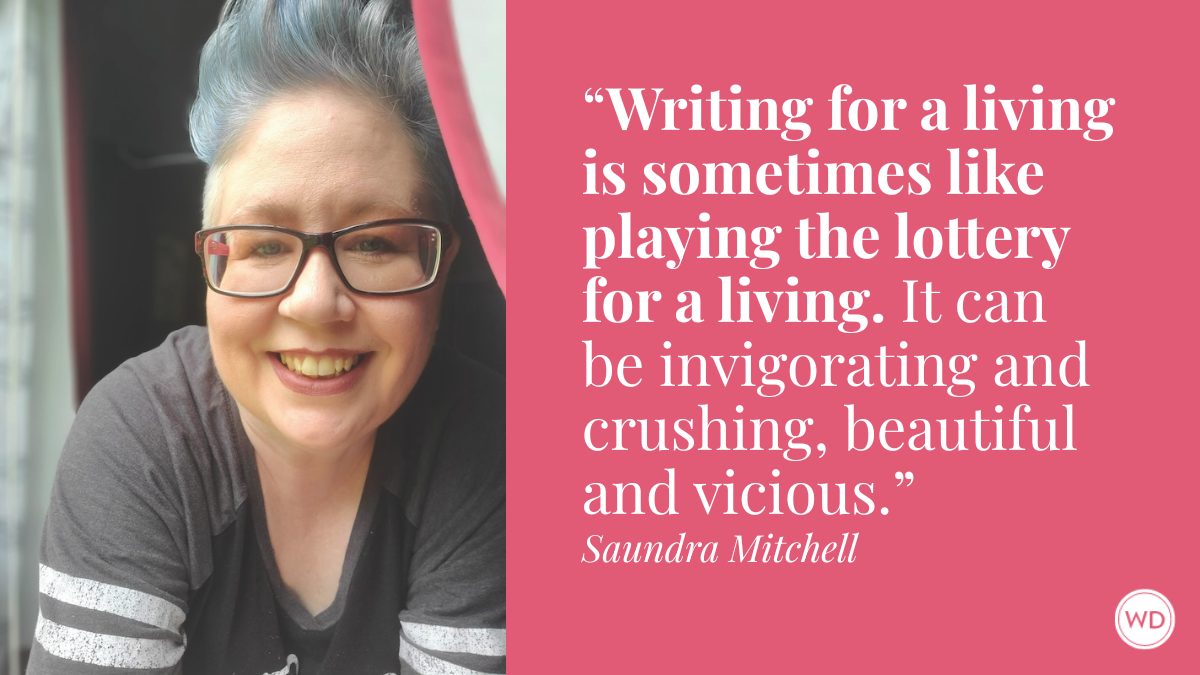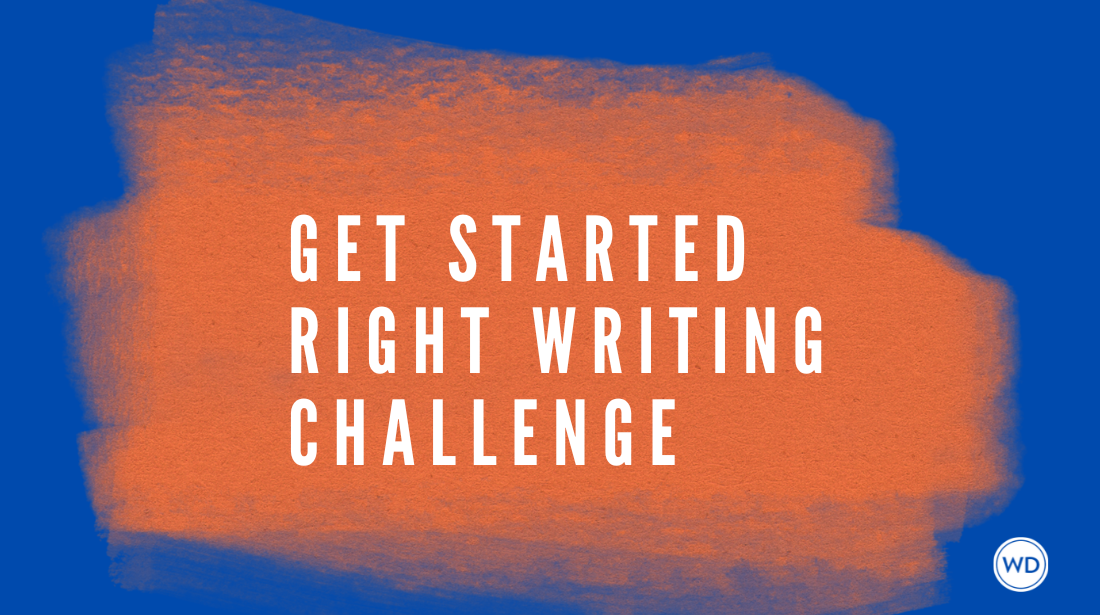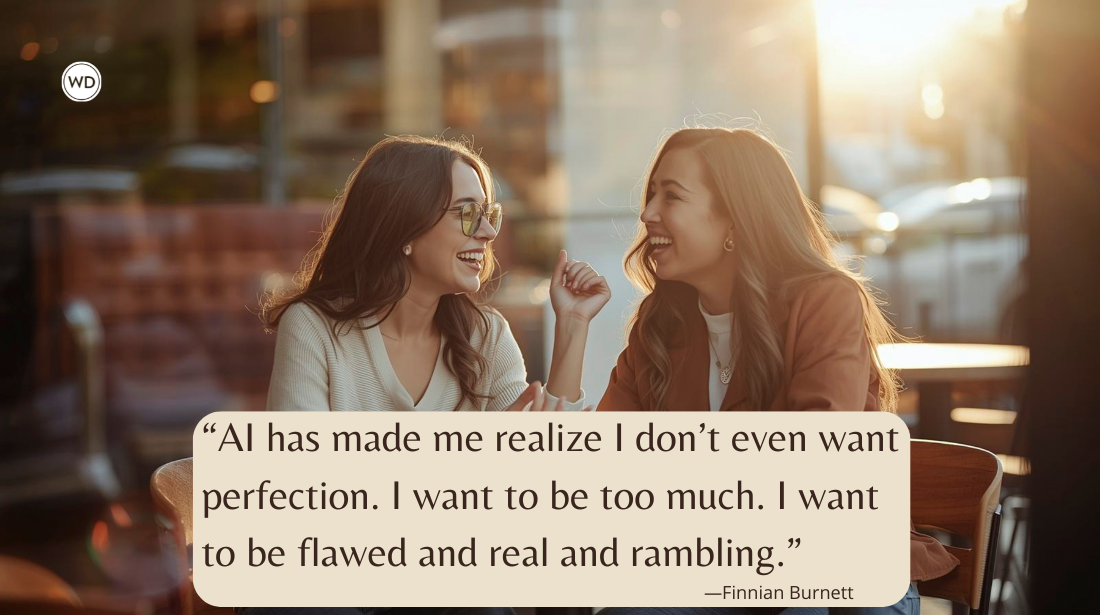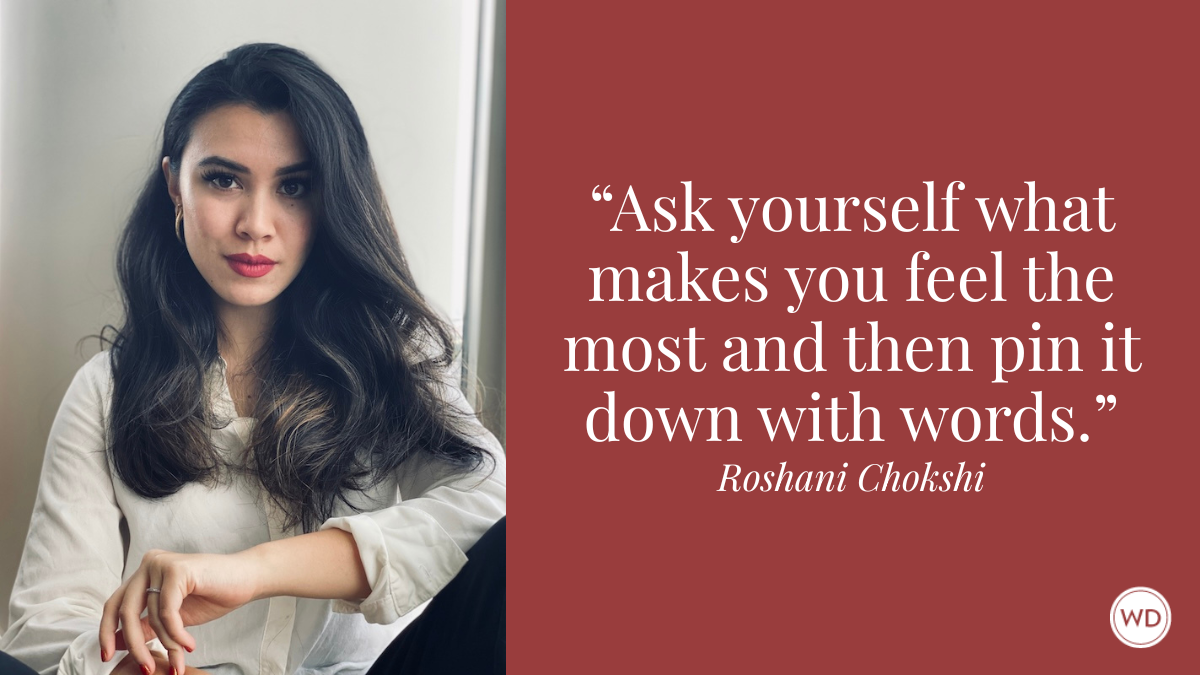Heidi Pitlor: Writing Contemporary Fiction in a Changing World
Heidi Pitlor, author of the new novel IMPERSONATION, spoke with WD about how ghostwriting, political memoirs, and her other job as series editor for The Best American Short Stories influenced the captivating story.
Impersonation is an infuriating book—and I mean that as the highest praise. With Allie Lang, novelist Heidi Pitlor has created a character in whom I became so deeply invested that I was, at times, infuriated for her and by her, much like one could be with a best friend or sister. And if I’m being honest, the times when I was frustrated that Allie wouldn’t stick up for herself were because I could see myself responding the same way. These are the best kind of novels: the ones that draw you in and make you feel connected to the characters and yourself.
Allie is a successful ghostwriter and struggling would-be novelist who also has to balance being a single mom in a town where she has no family and few reliable friends or neighbors, with a demanding, yet fickle career in publishing. The novel opens with Allie landing a huge ghostwriting gig for a hit TV personality, Nick Felles. After spending the first half of the advance, the book is canceled when Nick is outed for inappropriate behavior in the #MeToo movement, and Allie has to figure out what to do next to make up for the lack of income. Then, she’s given a dream assignment: ghostwriting the mom-memoir of a rising politician, Lana Breban.
But, Allie’s experience working as Lana’s ghost may seem over the top, which is exactly why I wanted to talk with Pitlor. Impersonation gives a behind-the-scenes look at the business and practice of being a ghostwriter interwoven with a deeply engaging story of Allie’s private life, and I wanted to find out where the line was between truth and fiction. But before we got to that topic, I started with another literary connection—the refrain of the first line of Virginia Woolf’s To the Lighthouse.
Our magazine and the website are all for people who want to be writers of different kinds and they're particularly interested in writing advice: how to find an agent, the ins and outs of how different aspects of how publishing works, etc. So that's why, when I read your book, I thought this is the book for our audience. For so many different reasons: it's so layered and we'll get to the question of ghostwriting, but I loved the connection to To the Lighthouse. That's one of my favorite books.
Oh, me too! I'm so glad you picked up on that because often times people are intimidated by Virginia Woolf. I didn't want her book to overpower mine. To the Lighthouse serves as a small but necessary thread in my novel, one that ultimately shows how overtaxed the narrator is.
I think, for people who know and love Virginia Woolf, that reference with your book is perfect because that book is loosely about the mother's relationship with her son, but also the artist trying to find her own voice. And those are both things that Allie struggles with and that she faces.
Exactly. Oh, you're my perfect reader.
Right! [Laughs] But I wondered, how and why did you decide to include that particular book?
I have to admit my editor and I came up with this idea together, and we wanted to capture those weird rhythms of writing. The procrastinating we do, and the time spent on research that takes you away from the central work and [my editor] said, “There's something that she [Allie] needs to be doing that she can't do. You know?” And we came up with idea: Allie should be trying to read a book. This conversation took place during one of countless noisy news cycles and we were both complaining about being unable to focus and to finish the books that we had started recently.
We decided that Allie would keep reading the same line from To the Lighthouse again and again, but find herself unable to focus enough to read any more.
In terms of the choice of To the Lighthouse, I wanted a book that was something people usually read as students but not later in life. I read this book in a women’s study class and poured over it, over every word. I miss thinking that way—as a working mom, I miss having the time to think that way.
That makes a lot of sense. That's so interesting that you talk about a book that we loved when we were younger, but wouldn't necessarily read later. You know, I never thought about that, but you're so right. I keep saying, “Oh, I need to go back and reread To the Lighthouse or The Waves or Mrs. Dalloway” and I never do.
I can't even tell you—it's been sitting on my desk or by my desk for 20 years. When people say, “Oh, in the summer I read that.” I think, Really, how? I guess I'm just an unusually busy person but someday, I hope to have a hammock with a pile of books and all the time in the world to enjoy them. I may be 80 when this comes, but I hope I’m lucky enough to get there.
You and me be both. So you mentioned the news cycle. And one of the things that I was really interested in with the book is you managed to weave so many current hot topics into the book: the 2016 election, the #MeToo movement, social media scandals. I wondered, when did you actually start writing this book? How long did it take, or how many drafts did you go through given the inclusion of all of those things?
I started writing Impersonation before Trump even announced his candidacy. I think this was early in 2015. I sat down with this idea for this book, which was very clearly about class, gender politics, power, and then within the next year or so, everything political in our country began to look very different. The realities of class, gender, politics and power became pawns essentially in campaigns. There was no way to write a contemporary book about these things without at least gently or tangentially mentioning the 2016 presidential campaign and all that happened afterward. I did not want this to overpower my characters or plot, so I worked hard to keep the real life stuff in the background.
The most useful thing to me was when I decided to have an end date to the book, and I knew I was writing to a certain moment and not beyond this point. Whatever happened in the real world after that point, so be it.
So five years you've been working on this book.
That five years includes a lot of stops and starts, production time, time to build up marketing and publicity. Real writing time probably amounts to two or three years of a few hours or more each workday.
Were there any surprises or learning moments for you as you wrote the book, as opposed to in the publishing process and the production process of the book?
Yes! Ideally there are surprises and learning moments in every book you write. With this book, I had to learn that a little reality goes a long way, especially the reality of the past few years. In general, I had to learn to pull back more. To pull back on adding in too much news, on Allie’s life being so overloaded. I had to find a way to give the fictional material some breathing room—which also means giving the reader some breathing room. I am always learning how to effectively communicate with the reader. Often as writers, we have a world in our head and neglect to share certain key elements with the reader.
Order your copy of Impersonation today.
[WD uses affiliate links.]
There was a line early on when Allie takes her son to Disney World and it's supposed to be this great family vacation, but she feels like all she's doing is saying no to him.
Most parents aren’t able to give their kids everything they want. Disney World felt like the perfect place for Allie Lang to be faced with having to say no constantly. Of course, like all family vacations, this one ends up being less of a fantasy than she would have liked.
It made me remember a family vacation. My sister has a four-year-old. So we all went [to Disney World] together last year and it made me think back on that. I started wondering how many times did my sister have to say no to my niece? And what must that felt like for her?
You want to be the person that gives her kids all or most of what they want, even if that’s not ultimately what’s best for them. COVID has driven this home to me. I don’t know any parents who feel that they can give their kids what they need or deserve right now. It’s so difficult.
You do focus a lot on the idea of being a single mom and making ends meet and how hard that can be in the publishing and writing world in particular. I wondered why it was important to you to shed light on that topic?
I wanted to show someone who’s in the business, but kind of floating outside of it. And just to amp up her struggles, I didn't want the story to be about marriage. My last book was, and I wanted her relationship to be there, but for it to not be the main thing. For it to kind of play into the story, but not be the end point of the story. And there is one [a relationship], there is the guy, the tenant who floats in and out, has his own ideals, but I didn't want that to be like she's trying to get him. She's just trying to live her life. He's sometimes in the way, sometimes helpful. That just felt more new and interesting to me.
I wanted her to be single for that reason. And just to have that feeling of the weight of the world—the emotional weight, the financial weight that women carry, the psychological weight, especially now with everything going on—that feeling of this panic that someone else's life is in your hands and just in her hands.
Let's talk about ghostwriting. In your book, you portray it as really challenging and particularly thankless, and I wonder what your connection to ghostwriting is, and is that what it's really like?
I have done a minute amount of it, but in some ways I am a ghost editor as Best American Short Stories series editor. I work with a different bestselling, award-winning fiction writer each year. I read 3-4,000 short stories and pick the best 120 to pass along to my guest editor. She picks the best 20 of these. In the end, I do a lot of behind-the-scenes work and my guest editor is the public face of the book each year. I’ve been lucky to work with some very generous and kind writers, but there is the potential in this relationship for some warped power dynamics. The relationship between Allie and Lana in Impersonation is 100 percent fictional, of course. If I wrote about my relationships with my guest editors, there would be nothing particularly dramatic to say.
Anyone who’s ever had a boss can imagine what it’s like to be a ghostwriter, I think. When you work for someone, you must anticipate their needs and the needs of the workplace or industry, and sometimes these needs might contrast with your own.
I did speak to quite a few ghostwriters when I was researching this book, and learned about the various dynamics at play in this work. It was fascinating. There is power in being a public face, but there is also power in giving someone else their words and helping to shape their story.
I also talked to political consultants and the interesting thing about this book was, a few people have said, “This wouldn't really happen. They wouldn't allow that.” Not only does it happen, this is a very tamed version of what happens with the political memoirs.
The best part about it was, I picked the best subject for a book because in interviewing them all, they knew exactly what details to give me because they know what makes a good story.
How did you find these people who are willing to talk to you?
I asked around, and got connected to friends of friends. I know a lot of writers and I talked to one or two well-known writers who also work at ghostwriting. Very few people just ghostwrite. Most of these people do other work as well. It's not uncommon to have to augment.
I work in publishing, so I know ghostwriting is a thing. We've done articles about it briefly before, nothing too in depth, but your book finally made me think about the moral and ethical code of the practice of ghostwriting.
Good, good. Yeah. [laughs]
Why is it OK for a public figure to put their name on this book that they didn't write, or at the very least why aren't the ghostwriters credited as coauthors? And why are public figures even concerned about hiding the fact that they used a ghostwriter? We all know that ghostwriters exist, so why not? What's so shameful about acknowledging that [they used one] because not everyone is a writer. And so my question is, what do you think about that as a practice? And do you think we'll we will ever see changes?
In ideal world, every well-known person would write their own book. Every writer would be paid what they are worth. Everyone would be able to afford everything necessary. This is not an ideal world, of course, and these are corrupt, politically fraught times. For better or worse, moral or immoral, ghostwriters exist and not every celebrity or politician is a good writer, and where there exists a need, there also often exists someone else who needs something and can fill this void. I think moral dilemmas can be uncomfortable in real life, but make for interesting fiction.
Yeah, absolutely. I struggled with the decisions that Allie made, but at the same time, I understood why she was making those decisions. Because like you said, she's got a pay her bills; she's got to take care of her kid.
Right. She moves forward reluctantly, but aware that she is doing what she has to do for her son and herself.
Yeah. Mostly it made me think back on all of the political memoirs I've read and thought I’ve been so lied to!
You may well have been. But don’t beat yourself up for it.
Like, did Michelle Obama really learn how to play the piano?
I don’t know, but I hope she did. We all have to believe in something. We all need our heroes, and at the end of the day, maybe it’s the belief itself that matters more than the veracity of the hero-ship. Belief and hope are what can get us through some days, right?
You said you've done a little bit of ghostwriting, but mostly the ghost editing. (Now I understand how those Best American Short Stories are published. Thank you for that.) Was there a particular experience with ghostwriting or ghost editing that helped you when it came time to write your own novels, aside from the idea for this book? I'm thinking about the times that Allie has to go and do her research, but then has to sit down and write for a due date. But then she's also trying to be creative with her own writing and she struggles with that.
I don’t know. On your best days, writing fiction is a dream state and it’s tricky to parse what is coming from where. I had a few smudges of certain people in mind, but not any one experience or person from whom I drew directly and substantially.
Writing, editing, and ghostwriting all involve some amount of feeling around in the dark. You start with nothing, the blank page, and you set down a word, and then another, and you hope that you are headed in the right direction. Some form of this happens during my work as a series editor. My most recent guest editor of The Best American Short Stories is Curtis Sittenfeld. While I do try to read and pull what I think are the best written stories, I also cannot ignore the tastes and personalities of my guest editors. With Curtis, one might think that she would prefer stories about prep schools or politician’s wives, but that was not the case. You cannot predict what fiction or art a person will choose based on their own output.
Right, right. Somehow she's [Allie] got to write this woman's [Lana] whole story. And she really knows nothing about her.
And people are trying to write her story [Allie’s] and they don't know anything about her. I have had this happen to me too. I have a prestigious, literary job, and people assume I live in New York, attended an ivy league college and studied English. In fact, I live in a suburb of Boston, went to college in Canada, and studied political science. People are rarely who you think they are based on just their job or hometown or other surface factors.
I've got one last question for you. If you could share one piece of writing or publishing advice with our readers, what would it be?
Especially now, in the time of COVID, I’ll advise writers to follow your true energy. Follow the writing project or read the book that energizes you. If you are pushing yourself to continue writing or reading something, take a break from this. Try something else that feels more gripping or fun or necessary, and then stay with this as long as possible.
About Amy Jones
Amy Jones is the Editor-in-Chief of Writer’s Digest and was the managing content director for WD Books. She is the editor of the Novel and Short Story Writer's Market and Children's Writer's and Illustrator's Market. Prior to joining the WD team, Amy was the managing editor for North Light Books and IMPACT Books. Like most WD staffers, Amy is a voracious reader and has a particular interest in literary fiction, historical fiction, steamy romance, and page-turning mysteries. When she’s not reading, Amy can be found daydreaming about Italy or volunteering at her local no-kill cat shelter. Find Amy on Twitter @AmyMJones_5.








